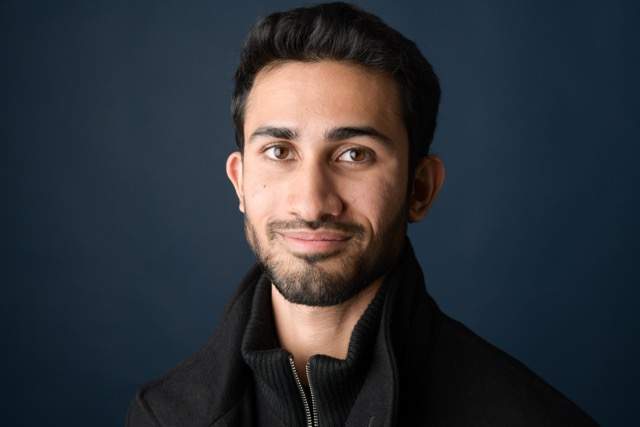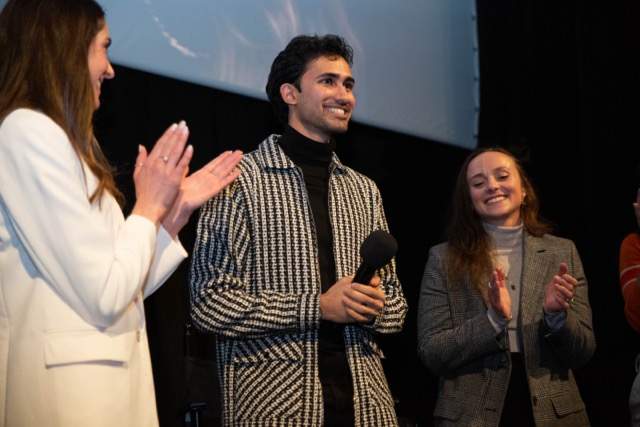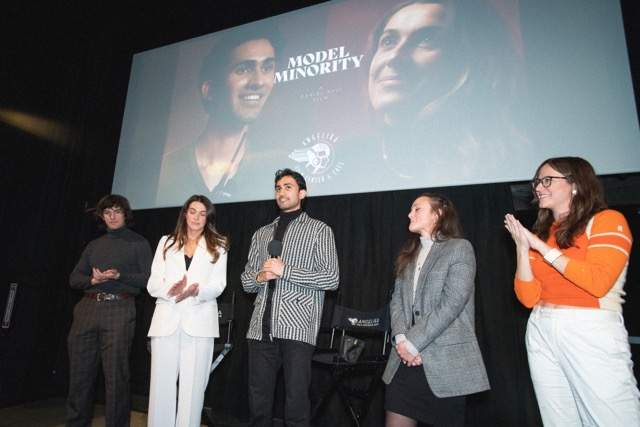
Engaging Prejudice with Comedy and Intelligence: Ary Satish of Model Minority

America has a long way to go in recognizing and rejecting prejudice. To obtain any sort of moral high ground requires an acceptance and understanding of one’s own shortcomings and inclinations; aspects neither fun or easily dealt with. This doesn’t mean that the process requires self-flagellation. The roots of modern film owes a great deal to the theater productions of Shakespeare and his use of wit and mockery to illuminate societal ills in a palpable manner. Model Minority is a film which undertakes such an approach to reflect racial discrimination and stereotypes in regards to people of Indian descent and culture. The film stars Ary Satish as Rudresh Patel, a man who is discovered in an unlikely manner and becomes an instant celebrity. Though there’s a great deal of difference that separates actor and character in this production, there’s certainly some experiential intersect that allows Mr. Satish (along with his extraordinary talent) to bring a transfixing and endearing quality to Rudresh. Model Minority’s sold-out world debut screening at the Angelika Film Center in NYC was followed by a Q&A with Ary giving his personal insight into the role and the film. Other speakers who’ve also been featured at Angelika Film Center include Angelina Jolie (Maleficent, Mr. & Mrs. Smith), Willem Dafoe (Spiderman, Aquaman), Mark Ruffalo (Avengers), Julianne Moore (The Hunger Games, Boogie Nights), Shia LaBeouf (Transformers, Fury), Ray Romano (The Irishman, Everybody Loves Raymond). Ary has graciously agreed to communicate some of his thoughts here for our readers who could not attend the Q&A at the Angelika.
The performance you deliver as Rudresh in this film is remarkable. I’m guessing that it has been hard for the public to separate you the actor from the character because this character seems so incredibly real. How did you approach understanding and cultivating him?

Ary Satish: A lot of the questions I was asked during the Q&A section of the premiere screening, related to this concept. I was asked questions like “What were the methods and techniques you had to use in order to bring this character to life on screen” and “What parts of Rudy’s character were the easiest to play or relate to, and what parts were the hardest to do both?” It’s fair to say a lot of the questions that I had received were pertaining to the acting method I had used in order to play Rudy and also about the specific acting choices I had made, and the reason behind why I chose to do them. And what I helped the audience understand through my answers to these questions was how my training in the Meisner technique prepared me to play this role, through specific Meisner exercises. I also did help the audience understand that the part of Rudy that I was able to relate to the most, was in his ability to dream and feel strongly enough that his dreams will come true. This is something I feel a lot of artists in general will relate to, which is why that element of Rudy was the easiest to play.
The American film industry is certainly moving towards a place where opportunities to tell different stories of the American experience are being sought out. Along with this comes the desire to utilize talented actors who bring an authenticity to the characters. You achieve this exceedingly well as Rudy in this film.

AS: Thank you for speaking to the authenticity of the portrayal of Rudy’s character, that was definitely the goal. However, I must say that myself in real life does not share very much in common with the character Rudy. Not only are our personalities very different, so are our attitudes and obstacles within our industries not to mention that Rudy’s obstacles were in the modeling industry and mine have always been in film. That’s actually what drew me to playing this character. The fact that Rudy is quite different to me, so it would take a greater deal of acting to bring an authentic character to life. Though Rudy is very different to me, I am sure he is a very relatable character to many even those outside of the entertainment industry.
The tone of this film is a key factor in its success. It’s an unexpected use of comedy to confront the deeply ingrained prejudices that exist in our country, but it’s one that is perfectly incorporated in Model Minority. In the wrong hands, this might not have been so effective and impactful. Were you ever concerned about this element of the film?
AS: When it comes to Model Minority, I believe our director, cast and team where very skillful in our approach. You can tell this by how many genuinely comedic moments there were in our film, while also having several believably dramatic moments as well. I see comedy has purely a tool, a medium by which a story can be told and hence a message can be delivered. Just like any other tool, the tool itself is not beneficial or dangerous, it’s just a tool. However, it is how the tool is used to tell a message that can be either beneficial or dangerous. When speaking on my general opinion in this matter, I think the benefits of using comedy when helping to explore and inform about bigotry, is that comedy can bring or make light of a more serious or dark subject, such as bigotry itself. Sometimes, when the subtextual subject matter is serious enough, counteracting it by showcasing this sub-textual matter through a tool, such as comedy, can make a person’s art far more digestible to the general audience, as they are not overwhelmed by either a comedic or dramatic tone. However, on the side of danger, a poor use of comedy as a tool to tell a message could lead to confusion or outrage by the audience. Making light of a serious subject matter is never easy and must be done very tastefully because of how difficult it is to execute properly.
Model Minority has received awards and nominations from all over the world. The Marina del Rey Film Festival, Brooklyn International Short Awards, Cannes Indie Short Awards, and other industry events have all recognized this exception film and its message. I want to also make note of the “Best International Short Film” award it received at the world-renowned Berlin Shorts Awards, not to mention you coming off of two “Best Actor” wins at the Cult Movies International Film Festival and the New York Film Awards, for your performance in your previous short film, Take Care. Do you enjoy taking part in events like the Q&A at the Angelika to give the audience insight into your interpretation of Rudy and his journey?
AS: I personally don’t feel that it’s necessary to explain to an audience where I am coming from as an actor, in order to deepen their understanding of what a film is trying to communicate. I do believe that a film should be able to stand on its own two feet when it comes to delivering a message for the audience. It should be able to communicate it solely by itself. If it’s not able to do that, and requires the additional conversation with the films actors, then the film by itself is not enough to derive the entire message from.
Although I said that it’s not necessary to hear from an actor regarding this, I do still believe that through mediums such as film Q&A‘s like the Q&A that I had at Angelika Film Center, the audience can then be exposed to a subsection of the work created by the actors in order to fill in their piece of the puzzle for a film, which I do think can be valuable, because you are hearing from other humans who each have their own views, opinions, ways of expressing and reflections on the film itself. It is a good way of humanizing the message behind a film, because you are quite literally hearing from a person who understands and has worked towards the message of a film. Being an actor myself, I absolutely am in support of there always being a talkback or a Q&A for their film after a screening, as it provides the actor with more exposure and more coverage, which then could allow them to grow their careers or fanbase, and even regardless of these two things, can help spread their take on a film’s message.
When you look back on the discussion with the audience after the Angelika screening and Q&A, what do you remember most?
AS: My favorite moment from the Q&A was when one of the audience attendees for the screening came up to me and introduced himself. He was a brown man that soon after introducing himself, told me that he was also a fellow Indian and wanted to make it a point to come up to me after the screening just to let me know his reaction to the film. He then went on to say that watching the film actually made him quite emotional because it was the first time he was seeing a brown/Indian person being the star and lead actor of an American story, where he gets to be the one who is the model and the hero. He is the one who is the star of the show, he is the chosen one. He went on to say that in so much of his life, all he had seen were Indian actors or brown actors in general (south Asian actors) play supporting characters or roles, which very often do not portray them as the heroic type. So, for him to see a film, which featured an Indian American model, who was the star of the show, was portrayed as very handsome, and in the very positive light, made him feel very special as an Indian and brown person himself. Hearing this was a very heartwarming feeling for me. Because like him, I too have always felt that across the spectrum of types of roles South Asian actors can play, so many types are still not brought to light. Model Minority brought a new type of role to light, getting to be the actor behind the feeling that he shared with me was a very special feeling, as I knew, and understood the impact that it had had on him, leaving both of us very proud. Yes this exchange was an important part of my career because it gave so much more meaning to the work that I was doing if South Asians are able to see the characters that I play and through them, see new forms of South Asian life on camera, it gives us all a more developed perspective with South Asian storytelling.
Writer: Winston Scott